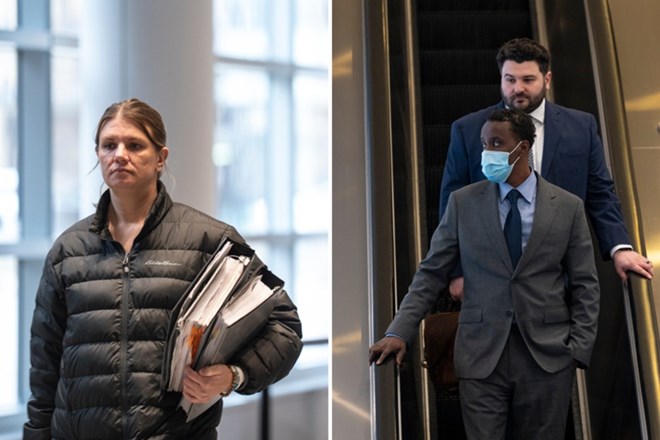
Wednesday March 19, 2025

Defendant Amy Bock, left, and Said Salim, front right, enter the federal courthouse in downtown Minneapolis on March 18, 2025, for closing arguments in the Feeding Our Future trial. Credit: Aaron Nesheim | Sahan Journal
MINNEAPOLIS, Minn (HOL) — Jurors began deliberations Wednesday morning in the high-profile Feeding Our Future fraud case, following six weeks of testimony and closing arguments from both prosecution and defence attorneys.
Federal prosecutors allege that Aimee Bock, founder of the now-defunct nonprofit, and restaurant owner Salim Said orchestrated a scheme that siphoned $250 million in pandemic relief funds meant to provide meals to children from low-income families. If convicted, both defendants face decades in prison.
In his closing argument, Assistant U.S. Attorney Harry Jacobs urged jurors to hold Bock and Said accountable, describing the case as "a fraud of epic proportions."
"While everybody else was trying to flatten the curve, they were fattening their wallets," Jacobs said, emphasizing that no children were fed while millions were stolen.Prosecutors allege that Bock received $1.9 million in fraudulent funds, including $900,000 in payments to her boyfriend under the guise of maintenance work. She also allegedly pocketed a $310,000 kickback for enrolling a nonprofit into the federal food program.
Said, whose restaurant, Safari, was one of the largest beneficiaries of Feeding Our Future, allegedly laundered $5.5 million, using the funds to purchase a $1.1 million mansion in Plymouth, luxury vehicles, and investment properties.
Jacobs dismissed the defendants' claims of legitimate business, stating:
"This program was about making meals, not millionaires."
Defence: "You Can't Hold Bock Accountable for Others' Actions"
Bock's attorney, Kenneth Udoibok, argued that she was not complicit in the fraud and instead tried to prevent misconduct within the program.
"You cannot hold Ms. Bock responsible for someone else's actions," Udoibok told jurors. He maintained that others within the organization were responsible for submitting fraudulent meal counts.
Said's attorney, Adrian Montez, portrayed his client as a legitimate businessman, stating that Safari Restaurant had a long-standing reputation for serving large community meals before the pandemic.
"They've taken that narrative and tried to transpose it onto Safari Restaurant to create a false story," Montez argued, showing jurors images of meals being prepared for distribution.
However, prosecutors countered that FBI surveillance showed little to no activity at the restaurant on days when millions of dollars in meals were reportedly served.
The trial is part of the largest COVID-19 relief fraud case in the U.S., with 70 defendants charged and $250 million in misused federal funds. Of those charged, 37 have pleaded guilty, while more cases are scheduled for trial in the coming months.
Jurors are expected to deliberate over seven charges against Bock and 21 against Said, including wire fraud, bribery, and money laundering.
Federal authorities have already recovered $75 million in assets linked to the scheme, with sentences ranging from 3 to 17 years for previous convictions.
"You have the power to end this story," prosecutor Matt Ebert told jurors in his final remarks.
A verdict is expected in the coming days.